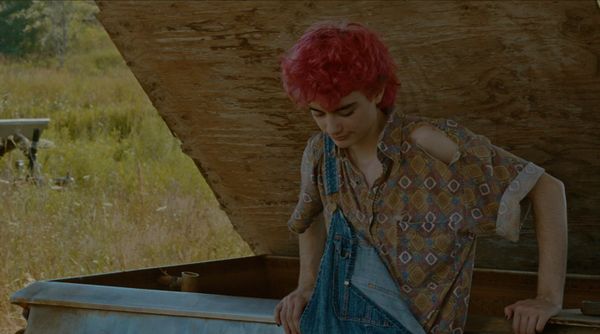Eye For Film >> Movies >> How To Fix Radios (2021) Film Review
How To Fix Radios
Reviewed by: Jennie Kermode

Every now and then, in the course of life, one stumbles into conversations about the places people come from and how much they love, or miss, their home towns. Straight people tend to casually engage with these conversations and then forget them. For many LGBTQ+ people, it's different: there is pain and careful silence. this is particularly common for those who have grown up in rural areas, where warm memories are often tarnished by recollections of what it means to be an outsider there right from the start.
Evan (James Rudden) is at ease in rural Southern Ontario, but still there's something pulling at him, implying an unconsidered need to get away. Right from the start of the film we see him gazing into the distance. his is an uncertain time in his life. he's finished school and isn't quite sure what to do with himself, but he's the responsible type, ready to pay his way, so he takes on a summer job at the local bait shop, resigned to doing tedious work through the long, sweltering days. This job brings him into contact with the pink-haired Ross (Dimitri Watson), who is the kind of person he would not have imagined himself knowing before. To his surprise, Ross is friendly and easy-going, keen to skive off when the boss isn't around, and friendship develops between them. It's a friendship that will have a cost for Evan, however, as other guys his age, who torment Ross whenever they get the chance, begin to show hostility towards him too.
The flowering of queer cinema in recent decades has seen a focus on relationship dramas and coming out stories, leaving little room for tales lie this which touch on other distinct yet less sensational aspects of queer life. Once he has lost his wariness of Ross, Evan becomes intrigued by his difference and impressed by his resilience in such a hostile environment. In one scene, Ross explains that he could have a normal hair colour and try to fit in but people would still bully him anyway and his hair lets him show them that he's not ashamed of who he is. Despite this, it's obvious that ongoing efforts to humiliate him do have an effect. Evan tries to be supportive but doesn't know how to tackle the underlying lack of empathy shown by those who persecute him, and his growing recognition of this aspect of the world has a profound effect on his own experience of moving into adulthood.
Although it's shot on a low budget and lacks the polish of most of today's successful queer films, How To Fix Radios has an important contribution to make. It's also very watchable and, ironically, its evocative relationship with the place where it was shot will give it a particular appeal to people from that region. The heat and humidity are visible throughout, adding to that sense of unspoken pressure on its central characters, but there's room for joy as well. Directors Casper Leonard and Emily Russell take it slowly and we get to spend long afternoons with friends idling by the waterside, laughing and catching frogs; as well as nights beside campfires which give us a glimpse into the primitive forces at work in the social conflicts they face.
Although it may seem to be going the way of many an inspirational tragedy, How To Fix Radios ultimately avoids the clichés and emerges as something more complex, less easily defined. It's intelligently, sensitively put together by people with a deep personal understanding of the experiences it depicts, and it's true to its subject matter in finding a distinct voice of its own.
Reviewed on: 01 Jun 2021















